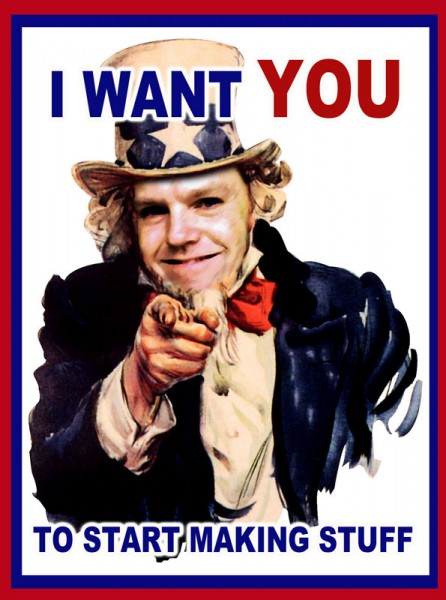Teaching your market has many benefits. Lets examine 7 advantages of educating your prospects for free, and how it can be an amazingly profitable strategy for you.
When I started my business at 2006 I was developing a website management system. The system’s main feature was being super easy to use. It’s second strength was automatically improving the site’s SEO.
Meet the uneducated customers
My target market was people who needed a website but had low computer and internet skills. A simple-to-use program was my solution to them. Most of them didn’t even have a website yet. That’s what I call today “Uneducated Customers“.
My offer appealed to these uneducated customers because it was an easy to use system that helped ranking well. They thought that it’ll be like magic.
They didn’t know better.
Once the website was launched, I sat down, one-on-one with each customer, and started teaching them the basics of SEO. I taught them why content matters, explained keywords, importance of consistency, articles length, back-links, multimedia…the whole lot.
I considered educating my customers a vital part of the business. Wouldn’t you?
THE OH-DEAR-GOD MOMENT
Funny creators, customers. The more time we spent together discussing SEO, they more restless they became. The more thorough I was, the angrier they got. The more I educated my uneducated customers, the less satisfied they were.
I was spending my precious one-one-one time with each customer, trying to help them out. Still, none of them were happy. How could it be? Something was terribly wrong.
Simply put, this is what happens when uneducated prospects become your uneducated customers. Tweet This
The Amazing Advantages Of Educating For Free
Advantage #1: You Get Educated Prospects
This is kinda obvious. If you educate your prospects and your market, you will get educated prospects. More than that, you will get prospects educated by you.
This means you get prospects and leads that trust you and acknowledge your position as a market expert. How much easier will it be to sell to them??
Let’s compare educating an uneducated customer (someone who already paid you) Vs. an uneducated prospect:

Advantage #2: You Save Money On Refunds And Customer Support
As the comparison above shows – it’s not only easier to sell (and up-sell) to educated prospects, but it’s also much easier to maintain and support educated customers compared to uneducated.
Let’s assume that thanks to you, your customers will have a better grasp of the market and better understanding of how to use and benefit from your services and products.
By what factor do you think your refunds rate will plummet? 50%? 70%?
Maybe 300%?
Add that to spending far less time and money on customer support and you’ve got yourself a nice addition to your bottom line.
Advantage #3: You Become An Authority
When you spend time educating your prospects, it’s inevitable that you will become an authority in your market. Your expertise will be acknowledged, and so will your opinions (you should really have some of those!).
Being an authority is obviously a huge advantage. You’ll be converting prospects at much favorable rates, while being able to get top dollar value for your services.
You will also attract higher paying and more professional customers. That’s how you attract people who value…value.
And oh yeah, in this frame you will also have the upper hand in negotiations.
Advantage #4: You Build Trust And Form a Tribe

Once you become a constant stream of great information, amazing things start happening.
Don’t believe it? Just check what providing completely awesome information for free did to people like Ed Dale from the 30 Days Challenge or Pat Flynn from Smart Passive Income.
Both Ed and Pat have MASSIVE tribes formed around them. When they have something to say, PEOPLE LINE UP TO HEAR THEM.
Any new offer these guys make, is sold even before they open their mouth.
Watching their social proof in action as a side viewer is intoxicating.
You can have the same.
Advantage #5: You Become The Go-To Guy
Once you start building a tribe, you are gaining mass.
Mass means one thing: Traction. It’s pure physics.
The bigger the tribe, the more traction you get. The more traction you get, the more referrals, traffic, subscribers, buyers, customers, joint-venture partners and opportunities you have.
It’s physics!
Advantage #6: Your Knowledge Will Improve Dramatically
This is a lesson I learned when I was 14 years old, on a summer vacation job at ‘Teva Pharmaceutical industries’ AKA the largest drug manufacturer in the world:
The best way to learn how to do something, is by teaching someone else how to do it first. Tweet This
Creating and curating a constant stream of content will force you to get better, to learn more, to know more.
You will naturally start reading more often and more sophisticated content, which is generally a good idea when doing business.
The art of transforming something your read to something you teach greatly enhances your understanding of the matter.
And it will drill the material into your cortex so hard, it’ll never leave. This is knowledge that’ll stay with you forever.
Advantage #7: Giving Stuff For Free Is A Very Profitable Plan
For most people, having more educated customers, higher conversion rates, social proof, forming a tribe, becoming an authority and the go-to guy of the market is enough.
But I get it, you shoot for the stars. You want to make every minute you put into your business count. It OK. I have one word for you:
Repurpose
Repurpose: Anything you give out for free, you can also repurpose and sell.
Your webinar or Google Hangout? Can be later sold as DVD or downloadable material. Your great blog posts? Can become an Ebook or even a real book. You can also convert them to audio and sell them as audio CDs or as podcast pro-subscriptions. Your talks can become an agenda for a talk you give in conferences. Possibilities are endless. Be creative!
Bringing It Home: An Action plan
I strongly believe that reading this post won’t do you any good unless you actually take action. Tweet This.
So here are some steps for you to take:
Evaluation & Assessment
Self evaluation
Ask yourself these questions, and be truthful in your answers:
- Did I ever have a buying experience where I made a bad decision because I was uneducated? How did that make me feel?
- Did I ever buy anything else from that seller?
- Do I put my customers in the same position?
- Am I aware of the dangers that converting uneducated prospects to uneducated customers poses to my business?
- Am I an authority in my field?
- Do I have a tribe of followers?
- Who are the leaders in my market? What information are they giving out?
- How could I outdo them?
Actions
Actions to take
Here are some actions you should take in order to improve your position, and start reaping the fruits of educating your market (DO IT!):
Contact your customers
Contact your customers and ask them the following questions:
- What do they wish they knew before they purchased your product?
- What gaps they still have about the field/market or your product?
Start Publishing
Start publishing content, under these guidelines:
- Publish at least once a week an answer to a question that a customer raised in your assessment phase.
- This is great not only for market leadership but also for customer satisfaction and engagement.
- Be consistent! You’re better off doing it once a week for a year than five times within one week and no more.
- Publish information you wish all your customers knew.
- Whenever you stumble upon a good resource – blog post, video, article – that you think your market will benefit of – share it!
- You should also share these little gems with your cold leads. It’s a great door opener. Don’t send the email expecting them to call you back. Send it because you care for your market and your prospects.
Resources
- The Challenge – Check out the more advanced modules for market leadership
- Blogging Tips You Should Know (From Pat’s blog)
- Pat’s blog post checklist – How to make sure your content gets somewhere.
- Always Be Shipping – learn how to become a market leader. Not cheap but great information in a very concise manner (Ed’s course).
- Seth Godin’s blog
- The Only 10 Blogging Tips You Need To Run A Popular Blog
- Please share in the comments any resources you would add!
There you have it. Educating your market and non-customers for free has amazing advantages. As the oldest trick in the book of sales goes – “why don’t you give it a try?” 🙂
Yours truly,
Meron
P.S. If you enjoyed this post you should Join My Mailing List, so you can get notified when a new post is out. You’re also welcomed to follow me on Twitter or share your thoughts on Facebook.





